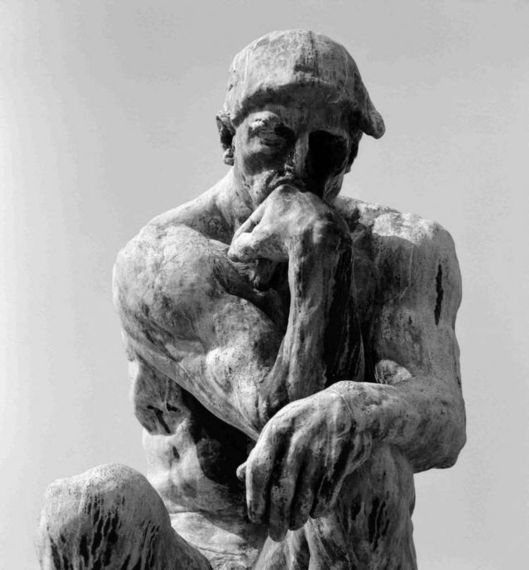
Photo by William Eggleston
Pedaling our lives like a trike up, down and around our demarcated driveway, we are compelled to push ourselves for the joy of the ride, motivated by the simpler things. But eventually, the joy wanes as the effort tires us and we desire rest.
While dealing with life's complexities, we try to rid the discomfort of the cerebral strain by tidying up where we can, assimilating sensible explanations into our tiny, categorical mental boxes, which coincidentally, are only shaped by our limited sensory experiences. It's why we cannot fully understand what it's like to be someone else without first processing it through our own piecemeal experiences.
Throughout the world and history, we've granted how explicit, concrete thinking is reserved for children not yet capable of grasping the abstract or anything beyond the literal. We also see how easy they are to show love and forgiveness unreservedly, making the intangible seem oh so simple. It is then we hardly complain of love being too simple.
The greatest of things, and still, we, like a child, can only make sense of love in its most basic form, that is, when experienced tangibly. Show me. I must feel it. Similar to faith without deeds being dead (requiring us to step out into the unknown), so, too, is love without action. Even "tough love" is senseless without the palpable, all-embracing, unconditional aspect.
Sadly, when love is richly described as so complete, I sense the general fluffy, mamsy-pamsy sentiment rise redirecting it into something more rational, more demanding.
It's difficult holding not only new ideas but also seemingly opposing ones in our mind. Our brains won't even allow us to hold two thoughts at the same time. But we do gain more knowledge. We also find with it comes the weight of responsibility, and soon, the stress of the unknown is upon us. It's then we desire our former ignorant, blissful days. If only we could love and trust again like that. But now we better understand life's fragility and its key sustaining force--love. Somewhere along the way, we came to realize we must work harder and prove our life's worth and advance our lovability. Perhaps this is linked to a base human feature connected to our survival needs. But it would be disingenuous to suggest the idea of love is so primitive and natural... childlike.
Unfortunately, our patchy ideas of such constructs as love, truth, and reality are considerably fragmented. We can't even comprehend that which we are most familiar with--ourselves. For some semblance of our and other's multifaceted identity, our linear working minds are forced to choose to favor certain features over others. As much as I want to believe in the idea of my caring, benevolent self, the need for individuality, self-enhancement or self-protection too often overrides the greater good of those around me.
We all have these options. If we are honest to the level that we can be, we might concede that we are all walking dichotomies when our mental disposition opposes our personal beliefs about ourselves. Such as it is when our nonconformist friends attempt to explain themselves. Our mental tipping point leans in either the compassionate or cautious self (who desires security in the predictable rather than disturb the status quo).
Those things we can't make sense of, such as loving our enemies, just doesn't compute due to our self-preservation and want for squelching the uneasiness of oddities. Is it any wonder why the Scriptures repeatedly refer to learning such novel concepts as milk is to babes not ready for the more substantial things? The point always being, though, we were not meant to stay there.
Eventually, as we mature, we mellow and begin to appreciate what our philosophers, scientists, poets, and yes, even the writers of the Scriptures saw -- the humility in resisting certain conclusions of things we cannot comprehend.*
What is to say, then, for those with the inner turmoil of things not so black and white? We are made to simplify. And so, we choose. Evidently, though, we respond according to the values we hold most dear.

Rodin, The Thinker Image source
Our 2024 Coverage Needs You
It's Another Trump-Biden Showdown — And We Need Your Help
The Future Of Democracy Is At Stake
Our 2024 Coverage Needs You
Your Loyalty Means The World To Us
As Americans head to the polls in 2024, the very future of our country is at stake. At HuffPost, we believe that a free press is critical to creating well-informed voters. That's why our journalism is free for everyone, even though other newsrooms retreat behind expensive paywalls.
Our journalists will continue to cover the twists and turns during this historic presidential election. With your help, we'll bring you hard-hitting investigations, well-researched analysis and timely takes you can't find elsewhere. Reporting in this current political climate is a responsibility we do not take lightly, and we thank you for your support.
Contribute as little as $2 to keep our news free for all.
Can't afford to donate? Support HuffPost by creating a free account and log in while you read.
The 2024 election is heating up, and women's rights, health care, voting rights, and the very future of democracy are all at stake. Donald Trump will face Joe Biden in the most consequential vote of our time. And HuffPost will be there, covering every twist and turn. America's future hangs in the balance. Would you consider contributing to support our journalism and keep it free for all during this critical season?
HuffPost believes news should be accessible to everyone, regardless of their ability to pay for it. We rely on readers like you to help fund our work. Any contribution you can make — even as little as $2 — goes directly toward supporting the impactful journalism that we will continue to produce this year. Thank you for being part of our story.
Can't afford to donate? Support HuffPost by creating a free account and log in while you read.
It's official: Donald Trump will face Joe Biden this fall in the presidential election. As we face the most consequential presidential election of our time, HuffPost is committed to bringing you up-to-date, accurate news about the 2024 race. While other outlets have retreated behind paywalls, you can trust our news will stay free.
But we can't do it without your help. Reader funding is one of the key ways we support our newsroom. Would you consider making a donation to help fund our news during this critical time? Your contributions are vital to supporting a free press.
Contribute as little as $2 to keep our journalism free and accessible to all.
Can't afford to donate? Support HuffPost by creating a free account and log in while you read.
As Americans head to the polls in 2024, the very future of our country is at stake. At HuffPost, we believe that a free press is critical to creating well-informed voters. That's why our journalism is free for everyone, even though other newsrooms retreat behind expensive paywalls.
Our journalists will continue to cover the twists and turns during this historic presidential election. With your help, we'll bring you hard-hitting investigations, well-researched analysis and timely takes you can't find elsewhere. Reporting in this current political climate is a responsibility we do not take lightly, and we thank you for your support.
Contribute as little as $2 to keep our news free for all.
Can't afford to donate? Support HuffPost by creating a free account and log in while you read.
Dear HuffPost Reader
Thank you for your past contribution to HuffPost. We are sincerely grateful for readers like you who help us ensure that we can keep our journalism free for everyone.
The stakes are high this year, and our 2024 coverage could use continued support. Would you consider becoming a regular HuffPost contributor?
Dear HuffPost Reader
Thank you for your past contribution to HuffPost. We are sincerely grateful for readers like you who help us ensure that we can keep our journalism free for everyone.
The stakes are high this year, and our 2024 coverage could use continued support. If circumstances have changed since you last contributed, we hope you'll consider contributing to HuffPost once more.
Already contributed? Log in to hide these messages.




